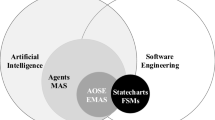Abstract
Gaia is a well-known Agent Oriented Software Engineering (AOSE) methodology. The emerging Model-Driven Engineering (MDE) paradigm encourages software modelers to automate the transition of one type of software model to another and eventually the code generation process. Towards this end we define a process for transforming the Gaia roles model liveness formulas to statecharts. This achievement on one hand allows the modeler to work on detailed agent design and permits, on the other hand, to automatically generate an agent’s code using any one of the statecharts-based tools in the market.
Preview
Unable to display preview. Download preview PDF.
Similar content being viewed by others
References
Budinsky, F., Steinberg, D., Ellersick, R., Merks, E., Brodsky, S.A., Grose, T.J.: Eclipse Modeling Framework. Addison Wesley, Reading (2003)
David, A., Deneux, J., d’Orso, J.: A Formal Semantics for UML Statecharts. Technical Report 2003-010, Uppsala University (2003)
García-Magariño, I., Gómez-Sanz, J.J., Fuentes-Fernández, R.: Model Transformations for Improving Multi-agent Systems Development in INGENIAS. In: 10th International Workshop on Agent-Oriented Software Engineering (AOSE 2009), Budapest Hungary (2009)
Gerber, A., Raymond, K.: MOF to EMF: there and back again. In: Proceedings of the 2003 OOPSLA workshop on eclipse technology eXchange (Eclipse 2003), pp. 60–64. ACM Press, New York (2003)
Harel, D., Kugler, H.: The RHAPSODY Semantics of Statecharts (Or on the Executable Core of the UML). In: Ehrig, H., Damm, W., Desel, J., Große-Rhode, M., Reif, W., Schnieder, E., Westkämper, E. (eds.) INT 2004. LNCS, vol. 3147, pp. 325–354. Springer, Heidelberg (2004)
Jouault, F., Bézivin, J.: KM3: A DSL for Metamodel Specification. In: Gorrieri, R., Wehrheim, H. (eds.) FMOODS 2006. LNCS, vol. 4037, pp. 171–185. Springer, Heidelberg (2006)
Kleppe, A., Warmer, S., Bast, W.: MDA Explained. The Model Driven Architecture: Practice and Promise. Addison-Wesley, Reading (2003)
Mikk, E., Lakhnech, Y., Petersohn, C., Siegel, M.: On formal semantics of Statecharts as supported by STATEMATE. In: Proceedings of the second BCS-FACS Northern Formal Methods Workshop. Springer, Heidelberg (1997)
Moraitis, P., Spanoudakis, N.: The Gaia2JADE Process for Multi-Agent Systems Development. J. Appl. Artif. Intell. 20(2-4), 251–273 (2006)
Object Management Group: Meta Object Facility (MOF) Core Specification (2001)
Object Management Group: Human-Usable Textual Notation V1.0 (2004)
openArchitectureWare (oAW), http://www.openarchitectureware.org/
Perini, A., Susi, A.: Automating Model Transformations in Agent-Oriented Modeling. In: Müller, J.P., Zambonelli, F. (eds.) AOSE 2005. LNCS, vol. 3950, pp. 167–178. Springer, Heidelberg (2006)
Rose, L.M., Paige, R.F., Kolovos, D.S., Polack, F.A.C.: Constructing models with the Human-Usable Textual Notation. In: Czarnecki, K., Ober, I., Bruel, J.-M., Uhl, A., Völter, M. (eds.) MODELS 2008. LNCS, vol. 5301, pp. 249–263. Springer, Heidelberg (2008)
Rosen, H.K.: Discreet Mathematics and its Applications, 4th edn. McGraw Hill, New York (1999)
Russel, S., Norvig, P.: Artificial Intelligence a Modern Approach, 2nd edn. Prentice Hall, Englewood Cliffs (2003)
Sendall, S., Kozaczynski, W.: Model Transformation: The Heart and Soul of Model-Driven Software Development. IEEE Softw. 20(5), 42–45 (2003)
Spanoudakis, N., Moraitis, P.: Automated Product Pricing Using Argumentation. In: Proceedings of the 5th IFIP Conference on Artificial Intelligence Applications & Innovations (AIAI 2009), Springer, Heidelberg (2009)
Zambonelli, F., Jennings, N.R., Wooldridge, M.: Developing multiagent systems: the Gaia Methodology. ACM T. Softw. Eng. Meth. 12(3), 317–370 (2003)
Author information
Authors and Affiliations
Editor information
Editors and Affiliations
Rights and permissions
Copyright information
© 2009 Springer-Verlag Berlin Heidelberg
About this paper
Cite this paper
Spanoudakis, N., Moraitis, P. (2009). Gaia Agents Implementation through Models Transformation. In: Yang, JJ., Yokoo, M., Ito, T., Jin, Z., Scerri, P. (eds) Principles of Practice in Multi-Agent Systems. PRIMA 2009. Lecture Notes in Computer Science(), vol 5925. Springer, Berlin, Heidelberg. https://doi.org/10.1007/978-3-642-11161-7_9
Download citation
DOI: https://doi.org/10.1007/978-3-642-11161-7_9
Publisher Name: Springer, Berlin, Heidelberg
Print ISBN: 978-3-642-11160-0
Online ISBN: 978-3-642-11161-7
eBook Packages: Computer ScienceComputer Science (R0)




